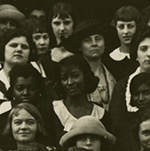 University Library
What She Said
University Library
What She Said
Part II: Women Together
Part III: Issue Spotlights
 University Library
What She Said
University Library
What She Said
Part II: Women Together
Part III: Issue Spotlights
While the fight to enfranchise women was long, some of the suffrage movement's early missteps ultimately contributed to its success, most notably the state-by-state strategy. By 1920, a broad base of support for woman suffrage and women's rights existed across the nation which persists today. Further, though voter turnout among women was lower than expected in 1920 due to literacy tests, poll taxes, and residency requirements, women today are as likely to vote as men.
While many 19th century movements can be called women's movements, the suffrage movement was a truly feminist one in that it consisted of women advocating for their own interests. Indeed, prominent suffrage activists like Lucretia Mott, Elizabeth Cady Stanton, Lucy Stone, Susan B. Anthony, and Victoria Woodhull are now considered first-wave feminists, despite the fact that suffrage ideologies framing morally-righteous white women as uniquely capable reformers feel fundamentally anti-feminist today.
The 19th Amendment resulted in one of the most significant expansions of voting rights in US history. In Los Angeles, women continued working to improve their communities and government after its adoption, often in groups and organizations they created themselves. While the language in the amendment itself clearly and simply states US citizens cannot be denied the right to vote because of their sex, its adoption was most immediately a victory for white women born in the United States. While the electorate has continually expanded over the intervening decades many Americans are still unable to vote. Some states permanently disenfranchise felons, who are disproportionately poor and of color, and residents of US colonies like Puerto Rico cannot vote in US presidential elections.
This concludes Part 1. Part 2, Women Together, begins in the case lining the south wall of the gallery, to your right.
1
Paul Jordan Smith. The Soul of Woman: An Interpretation of the Philosophy of Feminism. San Francisco: P. Elder & Co., 1916.HQ 1206 S6
2
Floyd Dell. Women as World Builders: Studies in Modern Feminism. Chicago: Forbes and Company, 1913.HQ 1399 D4 1913
3
Cover, The SuffragistJune 21, 1919
